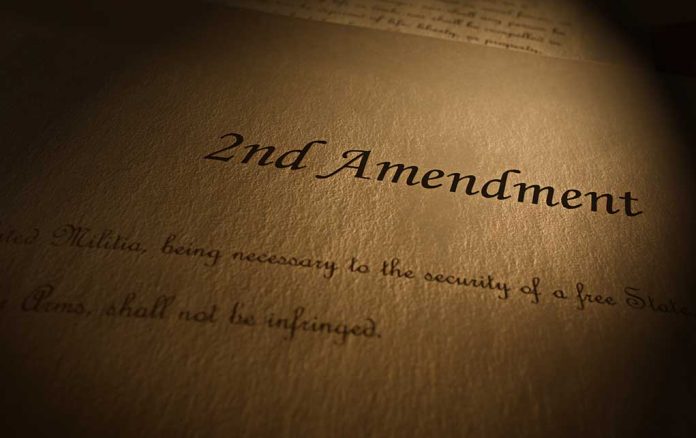
The Supreme Court is set to hear a critical Second Amendment case challenging D.C.’s ban on high-capacity gun magazines, potentially reshaping firearms regulations across the nation.
Key Takeaways
- Gun owners are asking the Supreme Court to review D.C.’s ban on magazines holding more than 10 rounds, which is punishable by up to three years in prison and a $12,500 fine
- The D.C. Circuit Court upheld the ban citing “historical analogues” from Prohibition-era laws restricting high-capacity weapons
- Circuit Judge Justin Walker dissented, arguing magazines with more than 10 rounds are commonly used for lawful purposes and thus protected under the Second Amendment
- The case follows the Supreme Court’s 2022 decision in Bruen requiring gun restrictions to have historical precedent
- The outcome could impact similar magazine capacity restrictions in other states
Legal Challenge Reaches Supreme Court
Gun owners in Washington D.C. have petitioned the Supreme Court to overturn the city’s ban on magazines holding more than 10 rounds of ammunition. Under the Firearms Registration Amendment Act of 2008, possession of such magazines is a felony, with penalties including up to three years imprisonment and a $12,500 fine. The petitioners, who hold concealed carry permits, argue the restriction violates their Second Amendment rights.
Gun Owners Take DC Magazine Restrictions To Supreme Court
Gun owners in Washington, D.C. are appealing to the U.S. Supreme Court to challenge a local law that bans magazines capable of holding more than 10 rounds of ammunition. The case, known as Hanson v. District of Columbia,… pic.twitter.com/VS9Pvo0Ct2
— The Wall Street Chronicles (@ThewallstChron) March 2, 2025
The case follows a consistent pattern of defeat in lower courts. Both a federal district court and the U.S. Court of Appeals for the District of Columbia Circuit upheld the magazine capacity restriction, with judges citing public safety concerns and historical precedent. The petitioners now hope the Supreme Court will resolve whether commonly used arms for lawful purposes can be banned under the Second Amendment.
Lower Court Rulings and Dissent
A D.C. Circuit panel rejected the challenge to Washington’s 10-round magazine restriction, following the framework established in the 2022 Supreme Court decision New York State Rifle & Pistol Association v. Bruen. This landmark ruling requires gun restrictions to have a “historical analogue” to be constitutional. The panel found that high-capacity magazines qualify as “arms” under the Second Amendment but determined that Prohibition-era restrictions on certain weapons provided sufficient historical precedent.
Circuit Judge Justin Walker issued a notable dissent, arguing that magazines holding more than 10 rounds are in common use for lawful purposes. Walker cited the Supreme Court’s 2008 decision in District of Columbia v. Heller, which established that commonly used arms cannot be banned by the government. This split in judicial opinion highlights the constitutional tensions at the heart of the case.
Broader Implications for Gun Rights
The Supreme Court’s decision to hear this case comes amid similar legal battles across the country. Washington state’s Supreme Court is currently considering a challenge to its own ban on large-capacity magazines. The legal arguments in these cases often center on whether magazines are constitutionally protected “arms” or merely accessories, and whether historical restrictions provide adequate precedent for modern bans.
Attorney George Lyon Jr., representing the challengers, plans to appeal to the Supreme Court, arguing the panel misinterpreted what constitutes a valid historical analogue. Gun rights advocates, including the NRA, have rallied around these challenges, while public safety organizations point to the use of high-capacity magazines in mass shootings. The NAACP has criticized both sides for failing to address the impact of gun violence on marginalized communities.
Balancing Rights and Public Safety
At the core of this case is the tension between individual Second Amendment rights and public safety concerns. Supporters of magazine restrictions argue they can reduce casualties in mass shootings by forcing shooters to reload more frequently. Opponents contend that law-abiding citizens need these magazines for effective self-defense and that such bans infringe on constitutional rights without adequately addressing crime.
The Supreme Court’s ruling could have far-reaching implications for similar restrictions across the country. Since the Bruen decision established the “historical analogue” test, lower courts have struggled to apply this standard consistently to modern firearms regulations. The Court’s decision in this case may provide clarity on how the Second Amendment applies to magazine capacity limits and potentially reshape gun regulations nationwide.
Sources:
DC Circuit swats Second Amendment challenge to ban on extended magazines
Washington Supreme Court Hears Challenge to Ban on Large-Capacity Magazines
Gun Owners Take DC Magazine Restrictions to Supreme Court







